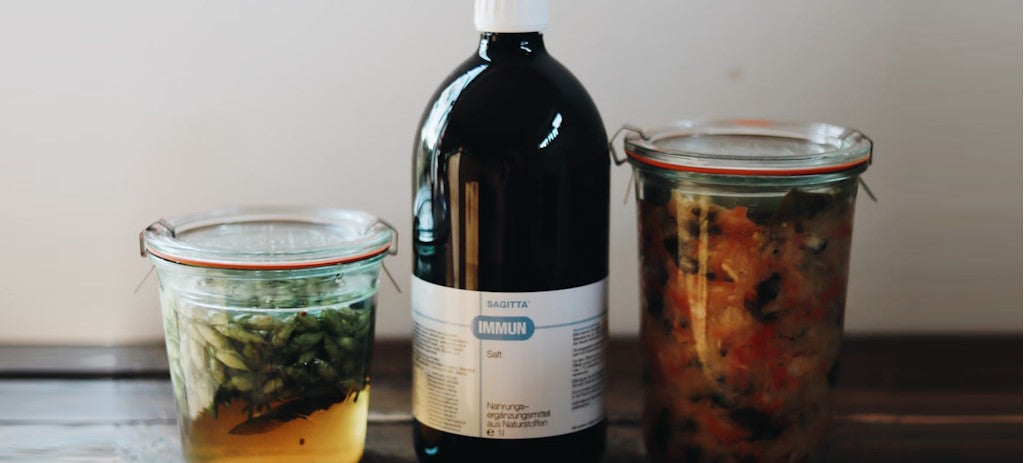Research findings on the microbiome
·

·
Every person has individual genetic information that distinguishes them from other people. The genetic information is present in every body cell and is present in the cell nucleus in the form of chromosomes. The difference in the individual genetic information of two people is only about 0.1%.
Every person also has their own individual microbiome, consisting of microorganisms in the form of bacteria, viruses and fungi. This microbiome has more microorganisms than humans have body cells. The genetic information of the microorganisms and thus of the entire microbiome therefore distinguishes two people much more clearly than the genetic information in their DNA in the cell nuclei.
Our individual microbiome needs to be nurtured and cared for. A balanced diet, from birth to old age, can make a decisive contribution to this. If the balance of the microbiome occurs despite good nutrition or due to incorrect nutrition, secondary diseases can be the consequence.
Due to its complexity and individuality, the microbiome is a very difficult field of research. With over a thousand different strains of bacteria, viruses and fungi that live together individually in the microbiome of a person, conclusions about changes in individual bacteria and their effects are difficult to recognize and understand. And it is even more difficult to develop meaningful measures from it.
Microbiome research is just beginning, but is growing rapidly worldwide. Some simple but very astonishing results of this young branch of research show how extensive the role that the microbiome plays in all areas of our body and its metabolic processes.
 Breast milk and microbiome
Breast milk and microbiome
Breast milk has a significant impact on the structure of the infant’s microbiome. Lactobacilli, such as Lactobacillus fermentum and reuteri, play an important role here. Studies have found that giving these lactobacilli as a diet or as a dietary supplement helps babies build their microbiome and immune system. They are better protected against diarrhoea, colic, respiratory diseases and skin allergies. If pregnant women take these probiotics before giving birth, this intake also helps the child, as a study shows.
obesity and microbiome
It is known from experiments with mice and animal husbandry that the composition of the microbiome can be responsible for obesity and that changes in the microbiome can lead to obesity.
Example: High-sugar diet and probiotic
The Pharmazeutische Zeitung (PZ) describes findings from experiments with mice at Keio University in Tokyo and Columbia University in New York. They show that a high-sugar diet damages the intestinal flora. Sugar seems to promote the growth of certain bacteria (Faecilabaculum rodentium) in the intestinal flora and inhibit that of other bacteria (segmented filamentous bacteria - SFB). Fewer SFBs stimulate fewer T helper cells and this disrupts fat breakdown. This effect occurs with a high-fat and high-sugar diet, but not with a high-fat diet WITHOUT sugar. If the mice also receive SFB as a probiotic, the number of T helper cells increases and normalizes the process.
„Mice have different SFB species than humans, but there are probably species in humans that fulfill these tasks, explains Prof. Dr. Ivaylo Ivanov in a press release from Columbia University..
Alcohol and microbiome
It is known that the individual microbiome is very stable. It regenerates after a few weeks after traveling abroad, taking antibiotics or changing your diet. If the microbiome changes permanently, diseases are the result. Excessive alcohol consumption, for example, leads to a characteristic change in the microbiome, which involves a disruption of the intestinal barrier and the absorption of bacterial metabolites into the blood, which burden the liver and lead to alcohol-related liver diseases.
depression and probiotics
In the journal Frontiers in Psychiatry, a team led by Dr. Caroline Wallace, Queens University in Kingston, Canada, a pilot study* in ten patients with moderately severe depression. They received a probiotic with lactobacilli and bifidobacteria for eight weeks. Already after four weeks there were clearly recognizable improvements in the clinical symptoms and after eight weeks there was also an improvement in the quality of sleep. None of the ten people reported side effects. Although the study does not meet all scientific requirements, the result is nevertheless very clear.h.
*DOI: 10.3389/fpsyt.2021
 Asthma and the microbiome
Asthma and the microbiome
It is now considered proven that children who grow up on a farm with traditional agriculture and a healthy mixed diet containing fiber show a lower risk of asthma, fewer food allergies and fewer allergic sensitizations. Many foods contain short-chain fatty acids, which play a major role in this. They are formed, for example, from fiber in fruit, vegetables and legumes and are found in oils such as coconut oil (MCT oil) and butter. In addition, lactobacilli in the intestinal flora produce these short-chain fatty acids from fiber. Their high concentration favors the balance in the metabolism towards the indexing of immunoglobulins, the production of anti-inflammatory messenger substances and the avoidance of tolerance formation.
Rheumatism and microbiome
It has been proven that a permanently changed microbiome, which results in a leaky intestinal barrier, plays a role in rheumatism at a very early stage, because functionally disturbed immune cells from the intestine get into the joints. On the one hand, attempts are now being made to repair the intestinal barrier with a drug and, on the other hand, to normalize the permanently shifted ratio of intestinal bacteria again through a high-fiber diet and thus eliminate the cause of the disturbed intestinal barrier.
As the example shows, the idea is slowly coming up as to whether it might not be cheaper to treat the microbiome early and in a targeted manner instead of treating the sick person afterwards.
Parkinson's and probiotics
Constipation is one of the non-motor symptoms of Parkinson's disease. Prof. Dr. Jan Kassubek from the University Clinic for Neurology in Ulm. He points to a study* showing that probiotic supplements can significantly improve both constipation and symptom-related quality of life. A combination of probiotics and prebiotic fiber products had previously shown improvement. This expansion of treatment options is appreciated by Prof. Dr. Kassubek as very pleasing, especially since it is largely free of side effects,
*Tan AH, Lim SY, Chong KK et al. Probiotics for constipation in parkinson disease. A randomized placebo-controlled study. Neurology. 2021; 96:e772.
age and microbiome
In a paper* published in the journal nature, Japanese and American researchers found that people over 100 years old have a microbiome that is enriched with microorganisms (e.g. Odoribacteriaceae) that produce secondary bile acids (e.g. produce isoallolLCA). These bile acids in turn have an antimicrobial effect on harmful bacteria (e.g. Clostridia, Enterococcus faecius). This could indicate that the microbiome of the centenarians has stabilized through this specific bile acid metabolism. Whether this can be used therapeutically is still being investigated.t.
The study involved 160 people over the age of 100, 112 people between the ages of 85 and 89, and 47 people between the ages of 21 and 55.
*DOI: 10.1038/s41586-021-03832-5
Every person also has their own individual microbiome, consisting of microorganisms in the form of bacteria, viruses and fungi. This microbiome has more microorganisms than humans have body cells. The genetic information of the microorganisms and thus of the entire microbiome therefore distinguishes two people much more clearly than the genetic information in their DNA in the cell nuclei.
Our individual microbiome needs to be nurtured and cared for. A balanced diet, from birth to old age, can make a decisive contribution to this. If the balance of the microbiome occurs despite good nutrition or due to incorrect nutrition, secondary diseases can be the consequence.
Due to its complexity and individuality, the microbiome is a very difficult field of research. With over a thousand different strains of bacteria, viruses and fungi that live together individually in the microbiome of a person, conclusions about changes in individual bacteria and their effects are difficult to recognize and understand. And it is even more difficult to develop meaningful measures from it.
Microbiome research is just beginning, but is growing rapidly worldwide. Some simple but very astonishing results of this young branch of research show how extensive the role that the microbiome plays in all areas of our body and its metabolic processes.

Breast milk has a significant impact on the structure of the infant’s microbiome. Lactobacilli, such as Lactobacillus fermentum and reuteri, play an important role here. Studies have found that giving these lactobacilli as a diet or as a dietary supplement helps babies build their microbiome and immune system. They are better protected against diarrhoea, colic, respiratory diseases and skin allergies. If pregnant women take these probiotics before giving birth, this intake also helps the child, as a study shows.
obesity and microbiome
It is known from experiments with mice and animal husbandry that the composition of the microbiome can be responsible for obesity and that changes in the microbiome can lead to obesity.
Example: High-sugar diet and probiotic
The Pharmazeutische Zeitung (PZ) describes findings from experiments with mice at Keio University in Tokyo and Columbia University in New York. They show that a high-sugar diet damages the intestinal flora. Sugar seems to promote the growth of certain bacteria (Faecilabaculum rodentium) in the intestinal flora and inhibit that of other bacteria (segmented filamentous bacteria - SFB). Fewer SFBs stimulate fewer T helper cells and this disrupts fat breakdown. This effect occurs with a high-fat and high-sugar diet, but not with a high-fat diet WITHOUT sugar. If the mice also receive SFB as a probiotic, the number of T helper cells increases and normalizes the process.
„Mice have different SFB species than humans, but there are probably species in humans that fulfill these tasks, explains Prof. Dr. Ivaylo Ivanov in a press release from Columbia University..
Alcohol and microbiome
It is known that the individual microbiome is very stable. It regenerates after a few weeks after traveling abroad, taking antibiotics or changing your diet. If the microbiome changes permanently, diseases are the result. Excessive alcohol consumption, for example, leads to a characteristic change in the microbiome, which involves a disruption of the intestinal barrier and the absorption of bacterial metabolites into the blood, which burden the liver and lead to alcohol-related liver diseases.
depression and probiotics
In the journal Frontiers in Psychiatry, a team led by Dr. Caroline Wallace, Queens University in Kingston, Canada, a pilot study* in ten patients with moderately severe depression. They received a probiotic with lactobacilli and bifidobacteria for eight weeks. Already after four weeks there were clearly recognizable improvements in the clinical symptoms and after eight weeks there was also an improvement in the quality of sleep. None of the ten people reported side effects. Although the study does not meet all scientific requirements, the result is nevertheless very clear.h.
*DOI: 10.3389/fpsyt.2021

It is now considered proven that children who grow up on a farm with traditional agriculture and a healthy mixed diet containing fiber show a lower risk of asthma, fewer food allergies and fewer allergic sensitizations. Many foods contain short-chain fatty acids, which play a major role in this. They are formed, for example, from fiber in fruit, vegetables and legumes and are found in oils such as coconut oil (MCT oil) and butter. In addition, lactobacilli in the intestinal flora produce these short-chain fatty acids from fiber. Their high concentration favors the balance in the metabolism towards the indexing of immunoglobulins, the production of anti-inflammatory messenger substances and the avoidance of tolerance formation.
Rheumatism and microbiome
It has been proven that a permanently changed microbiome, which results in a leaky intestinal barrier, plays a role in rheumatism at a very early stage, because functionally disturbed immune cells from the intestine get into the joints. On the one hand, attempts are now being made to repair the intestinal barrier with a drug and, on the other hand, to normalize the permanently shifted ratio of intestinal bacteria again through a high-fiber diet and thus eliminate the cause of the disturbed intestinal barrier.
As the example shows, the idea is slowly coming up as to whether it might not be cheaper to treat the microbiome early and in a targeted manner instead of treating the sick person afterwards.
Parkinson's and probiotics
Constipation is one of the non-motor symptoms of Parkinson's disease. Prof. Dr. Jan Kassubek from the University Clinic for Neurology in Ulm. He points to a study* showing that probiotic supplements can significantly improve both constipation and symptom-related quality of life. A combination of probiotics and prebiotic fiber products had previously shown improvement. This expansion of treatment options is appreciated by Prof. Dr. Kassubek as very pleasing, especially since it is largely free of side effects,
*Tan AH, Lim SY, Chong KK et al. Probiotics for constipation in parkinson disease. A randomized placebo-controlled study. Neurology. 2021; 96:e772.
age and microbiome
In a paper* published in the journal nature, Japanese and American researchers found that people over 100 years old have a microbiome that is enriched with microorganisms (e.g. Odoribacteriaceae) that produce secondary bile acids (e.g. produce isoallolLCA). These bile acids in turn have an antimicrobial effect on harmful bacteria (e.g. Clostridia, Enterococcus faecius). This could indicate that the microbiome of the centenarians has stabilized through this specific bile acid metabolism. Whether this can be used therapeutically is still being investigated.t.
The study involved 160 people over the age of 100, 112 people between the ages of 85 and 89, and 47 people between the ages of 21 and 55.
*DOI: 10.1038/s41586-021-03832-5





Comments
Joringel —
Alles sehr gut beschrieben und nachvollziehbar. Dass fermentierte Lebensmittel, Hagebutten, Zwiebel und andere lokal erhältliche “Schätze der Natur” gesund alt werden lassen, kann ich an einigen Familienmitgliedern feststellen. Vielen Dank für den guten Überblick über die vielzähligen Einflüsse einer gsunden Darmflora